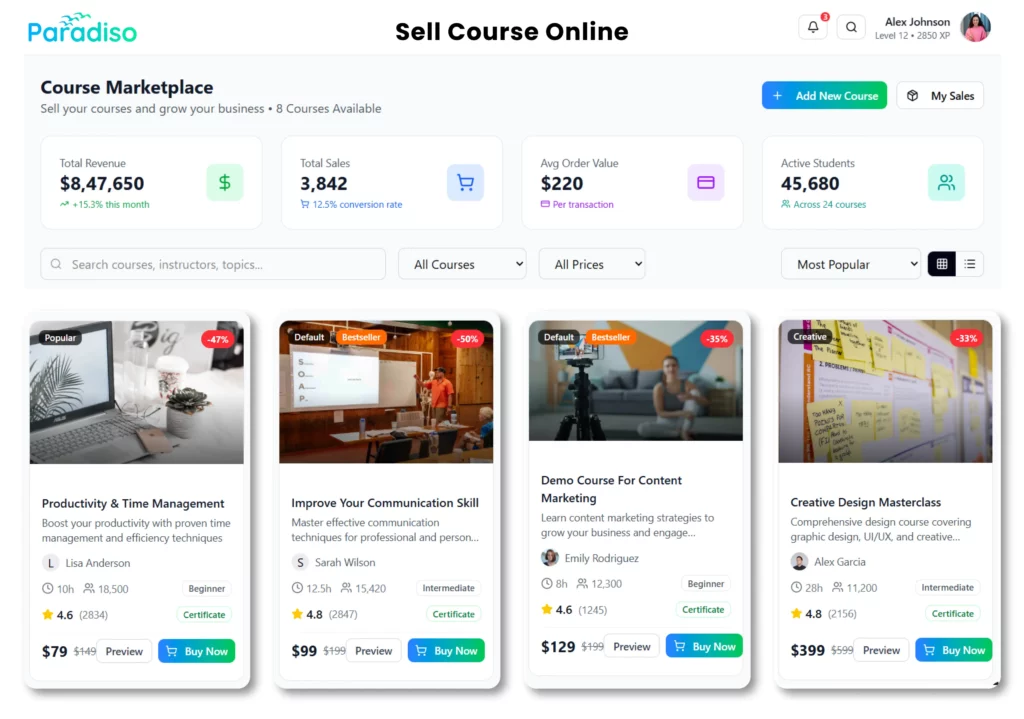The best external training LMS (Learning Management System) is one that is tailored to meet the specific needs of your external training program and learners. A good LMS should have the necessary features and functionality to support your training goals and objectives, be user-friendly for both administrators and learners, and have scalability to accommodate a growing number of learners. Other important factors to consider a good External Training LMS should have features like easy course creation, mobile compatibility, tracking and reporting capabilities, and integration with other systems.
Additionally, it should be user-friendly for both administrators and learners, have good support and maintenance, and scalability to accommodate the growing number of external learners.
What is external training LMS?
An External Training LMS (Learning Management System) is a software platform that is used to manage, deliver, and track online training programs for external learners. These learners can be employees of other companies, partners, or customers. The LMS allows organizations to create, host, and deliver online training content to a large number of external learners in a convenient and cost-effective manner. It also provides tools for tracking learner progress, generating reports, and analyzing training data.
Additionally, an External Training LMS typically includes features such as course creation and management, user registration and management, testing and assessment, and certification. It allows organizations to manage and track the progress of their external training programs and learners, and to provide them with the necessary support to complete their training.
If we talk about external training LMS, there are three types of LMS solutions:
Customer training LMS :
It is software that teaches customers how to use your product or service in the most efficient and effective way possible to achieve their particular objectives. However, these initiatives go beyond the essential USPs and selling points.
Every aspect of the customer experience should be covered in your plan for external training. Customer training’s learning management system, for instance, highlights upgrades and add-ons that maximize functionality and boost ROI. Customer guidance increases perceived value of your product and increases brand engagement.
Partner training LMS:
Expanding your business necessitates receiving training for channel partners or resellers. Training for channel partners is essential in order to help them comprehend the product’s features and benefits.
Partners have more control over when and where they can access their training thanks to a customer training learning management system that is compatible with mobile devices. For instance, if a salesperson needs to go over the details of a product before meeting with a potential customer, they might immediately be able to access a training video on their mobile device.
Associate member training:
The Association Learning Management System (ALMS) is a platform for involving members, providing them with added value, and constructing an outstanding community for learning and knowledge sharing. In addition, it serves as a management and streamlining platform for the association’s learning and training program.
The advantages of using a learning management system for external training have recently gained a lot of traction in every business because they make external and internal eLearning-programmed training simpler and more adaptable.
Key points to remember before Choosing an External Training LMS
Seamless integration
Social networks should be properly integrated so that students can share courses, post directly about the course they just finished, or even ask for help with a topic they’re stuck on in order to reach a larger audience and improve communication between instructors and students. This can be done on the forum for the course or on another social media platform. More people will learn about the course, and your course will eventually reach an even wider audience than it did before.Focus on user experience
Because each learning experience is unique, worldwide video streaming, self-registration, and mobile responsiveness are all high objectives. Additionally, users should have a consistent appearance and experience when accessing your LMS for external education.Reporting
Engaging your students from the very beginning of the data collection phase of the training cycle is one key to developing efficient strategies for engaging learners. KPIs may not always cover the entire job, even though it is common practice to examine performance data to identify skill gaps and learning requirements. Obviously, statistics and numbers should be used for analysis, but they don’t show everything. The most efficient method for determining your students’ actual learning requirements is engagement.Final Thoughts:-
Yes, creating an online course can be a rewarding way to share your knowledge and experience with others while also generating income. It allows you to scatter your expertise to reach a larger audience and make a difference in their lives. It can also be a flexible and scalable way to generate passive income. You can also learn to create a course to sell by following the step-by-step guide.














